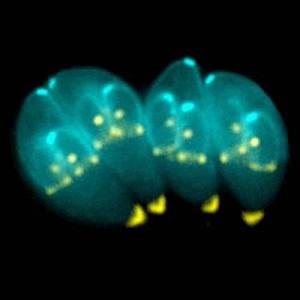TUESDAY, 13 DECEMBER 2011
Dopamine is a neurotransmitter produced naturally in the body; a chemical messenger used to relay signals between nerve cells. Dopamine acts on reward and pleasure regions in the brain and has wide ranging effects on movement, thought and emotions such as fear. Several neurological disorders are attributed to altered dopamine transmission, including schizophrenia, Parkinson’s disease and attention deficit hyperactivity disorder.A research group at the University of Leeds has discovered that a brain parasite, Toxoplasma gondii, increases the amount of dopamine produced by brain cells. Building on earlier findings, the scientists have shown that the parasite’s genome includes a gene encoding the enzyme tyrosine hydroxylase. This enzyme is required for the synthesis of dopamine from precursor molecules.
Toxoplasma gondii has been shown to change the behavior of its host. Rats infected with the parasite display reduced fear of their predators. This works in the parasite’s favour, helping it to reach its true host, the cat. The parasite can then complete its life cycle via transmission through cat faeces.
While these studies have been conducted in rodents, researchers believe the results may also have implications for humans. 10-20% of people in the UK carry this parasite as cysts and, although most are healthy, it can have harmful effects in those who are pregnant or have impaired immune systems. Since the parasite can reside in multiple brain regions, it can have a range of neurological effects on an individual. There is already some evidence suggesting a connection between the infection and schizophrenia. Scientists now plan to look more closely at how the parasite produces dopamine, and the effects this may have on behaviour.
Written by Ayesha Sengupta

